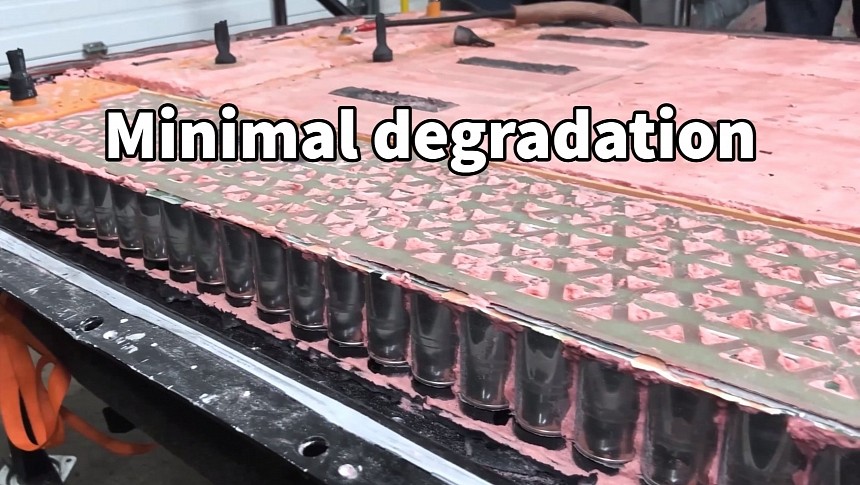EV battery degradation is one of the most critical factors that deter people from buying an electric vehicle. Tesla thinks this is a non-issue, considering EV battery degradation is insignificant. In its Impact Report 2022, Tesla shows that even after 200,000 miles of usage, the batteries lose an average of 12 percent of their capacity.
Li-Ion batteries lose capacity, even when not actively charged and discharged. This is a well-known fact that many people learn from their mobile devices, such as laptops and mobile phones. The batteries in these devices quickly lose their advertised capacity, and many are used to replacing them after just two years. This makes people reluctant to embrace electric vehicles, which have a much higher price and are less practical to replace after two years of use.
Few people know that Li-ion batteries in electric vehicles are not the same and are not used the same as those in mobile phones. The chemistry is different, allowing for more charge-discharge cycles and, thus, longer life. Electric vehicles also have thermal management systems that ensure stable operation in optimal conditions, prolonging their lifecycle.
Finally, EV batteries have larger capacity buffers, meaning they don't discharge as deep or charge as much as phone batteries. This limits battery degradation, which is accelerated closer to state-of-charge limits. Keeping your car between 20% and 80% state of charge also helps to extend the battery lifecycle.
Having been producing electric vehicles since 2008, Tesla has more experience with Li-Ion batteries than any other carmaker. Having made the vast majority of EVs on the road today also helps, especially as Tesla gathers a lot of data from its vehicles. Based on this data, the carmaker calculated that its average EV battery loses only 12 percent of its capacity after 200,000 miles of usage. According to Tesla, this is the average mileage when a vehicle is usually scrapped in the US, with Europeans scrapping their cars after 150,000 miles on average.
The numbers are relevant for the nickel-based chemistries that Tesla uses in its higher-performing models. Newer chemistries, such as Lithium-Iron-Phosphate (LFP), are not included in this study since there is insufficient data. However, LFP cells usually have much longer lifecycles than ternary batteries, so the numbers could only improve when this data becomes available. Tesla indicated that it intends to update the report once sufficient data is gathered from the fleet.
Mileage is only one factor in battery degradation, with battery age being another. Since Li-Ion batteries degrade even when unused, battery aging could also affect lower mileage vehicles. This has less impact on high-mileage vehicles, as most of the degradation is caused by charging and discharging. Even so, Tesla thinks its car batteries can last for the vehicle's lifetime. This is good news, considering how expensive replacing a car's battery is.
Few people know that Li-ion batteries in electric vehicles are not the same and are not used the same as those in mobile phones. The chemistry is different, allowing for more charge-discharge cycles and, thus, longer life. Electric vehicles also have thermal management systems that ensure stable operation in optimal conditions, prolonging their lifecycle.
Finally, EV batteries have larger capacity buffers, meaning they don't discharge as deep or charge as much as phone batteries. This limits battery degradation, which is accelerated closer to state-of-charge limits. Keeping your car between 20% and 80% state of charge also helps to extend the battery lifecycle.
Having been producing electric vehicles since 2008, Tesla has more experience with Li-Ion batteries than any other carmaker. Having made the vast majority of EVs on the road today also helps, especially as Tesla gathers a lot of data from its vehicles. Based on this data, the carmaker calculated that its average EV battery loses only 12 percent of its capacity after 200,000 miles of usage. According to Tesla, this is the average mileage when a vehicle is usually scrapped in the US, with Europeans scrapping their cars after 150,000 miles on average.
The numbers are relevant for the nickel-based chemistries that Tesla uses in its higher-performing models. Newer chemistries, such as Lithium-Iron-Phosphate (LFP), are not included in this study since there is insufficient data. However, LFP cells usually have much longer lifecycles than ternary batteries, so the numbers could only improve when this data becomes available. Tesla indicated that it intends to update the report once sufficient data is gathered from the fleet.
Mileage is only one factor in battery degradation, with battery age being another. Since Li-Ion batteries degrade even when unused, battery aging could also affect lower mileage vehicles. This has less impact on high-mileage vehicles, as most of the degradation is caused by charging and discharging. Even so, Tesla thinks its car batteries can last for the vehicle's lifetime. This is good news, considering how expensive replacing a car's battery is.
Tesla exists to accelerate the transition to sustainable energy.
— Tesla (@Tesla) April 24, 2023
Impact Report 2022 → https://t.co/Zj8onKMJrT
—
2022 Highlights
Last year, our customers avoided releasing about 13.4 million metric tons of CO2e into our atmosphere ????
Tesla vehicle emissions are significantly… pic.twitter.com/2CvMNPGeVh






